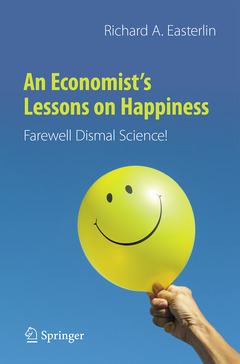Description
An Economist's Lessons on Happiness, 1st ed. 2021
Farewell Dismal Science!
Author: Easterlin Richard A.
Language: English
Subjects for An Economist's Lessons on Happiness:
Approximative price 16.87 €
In Print (Delivery period: 15 days).
Add to cart179 p. · 15.5x23.5 cm · Paperback
Description
/li>Contents
/li>Biography
/li>Comment
/li>
Once called the ?dismal science,? economics now offers prescriptions for improving people?s happiness. In this book Richard Easterlin, the ?father of happiness economics,? draws on a half-century of his own research and that conducted by fellow economists and psychologists to answer in plain language questions like: Can happiness be measured? Will more money make me happier? What about finding a partner? Getting married? Having a baby? More exercise? Does religion help? Who is happier?women or men, young or old, rich or poor? How does happiness change as we go through different stages of life?
Public policy is also in the mix: Can the government increase people?s happiness? Should the government increase their happiness? Which countries are the happiest and why? Does a country need to be rich to be happy? Does economic growth improve the human lot?
Some of the answers are surprising (no, more money won?t do the trick; neither will economic growth; babies are a mixed blessing!), but they are all based on reason and well-vetted evidence from the fields of economics and psychology. In closing, Easterlin traces the genesis of the ongoing ?Happiness Revolution? and considers its implications for people?s lives down the road.
Introduction.- Part I: First Lessons.- Measuring Happiness.- Does Money Make People Happy?.- How Does Health Affect Happiness?.- Family Life and Happiness.- How Can I Increase My Happiness?.- Part II: Next Lessons.- Can Government Increase My Happiness: Transition Countries.- Can Government Increase My Happiness: Nordic Countries.- Happiness or GDP?.- Part III: Q & A.- Who Is Happier—Young or Old? Women or Men?.- More on Money and Happiness.- What About Democracy, Religion, Charity, Volunteering, Etc.?.- Who to Believe? Psychology or Economics?.- Critiquing the Paradox.- Part IV: History Lessons.- Dawn of the Happiness Revolution.- Dream on, Professor!.
Richard A. Easterlin is a member of the National Academy of Sciences, a Distinguished Fellow of the American Economic Association, and a Fellow of the American Academy of Arts and Sciences. He is a former president of the Population Association of America, Economic History Association and Western Economic Association International.
Offers prescriptions for improving people’s happiness
Explains how personal happiness can be measured
Shows what governments can do to improve happiness in societies




